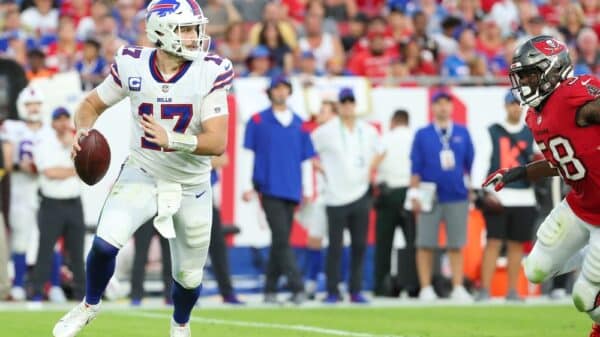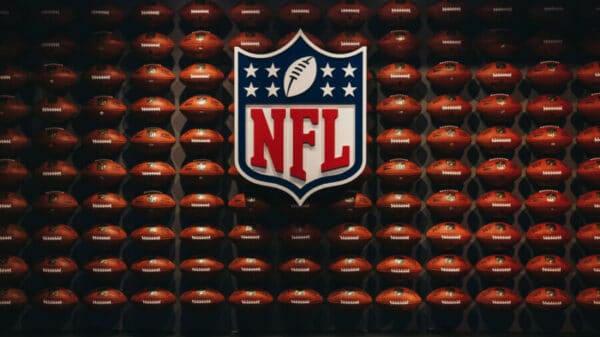Josh Allen’s recent win of the NFL MVP award caught many by surprise, especially since it came at the expense of Lamar Jackson, who many believed had clinched the trophy with stellar performances in the latter part of the season. For those who follow football closely, the back-and-forth competition between these two quarterbacks was a testament to the unpredictable nature of MVP voting. While Allen was able to lift the trophy this year, Jackson, with his electrifying performances, seemed poised for a back-to-back MVP run after being named First-Team All-Pro.
In the world of football, achieving All-Pro status is a significant recognition—they’re essentially the best of the best, chosen by a group of experienced voters. But what’s intriguing here is how the same panel could shower accolades upon Jackson yet decide not to award him the MVP title. Rich Eisen, a well-respected sports commentator with over two decades of NFL experience, pointed out this paradox. He has witnessed enough MVP voting patterns to understand that the selectors often dance to the beat of unpredictability. In fact, Eisen felt it was entirely within reason for the voters to acknowledge Jackson’s excellence without awarding him the ultimate prize. “It’s thoroughly unpredictable for them to give Lamar First-Team All-Pro and not vote him MVP. Didn’t surprise me one bit,” he remarked, providing insight into the sometimes convoluted psychology of MVP voting.
What clearly distinguished Allen’s candidacy was his ability to elevate the Buffalo Bills to new heights. The Bills, under his leadership, demonstrated a kind of ferocity on the field that turned them into formidable opponents. Big wins against teams like the Lions and the Chiefs showcased Allen’s capability to drive his team to success even when the pressure was on. However, despite those impressive statistics—4,262 passing yards, 40 touchdowns, and a passer rating of 101.4—skeptics pointed out that the Bills’ lighter schedule in the critical closing weeks of the season might have affected Allen’s candidacy. “But Josh didn’t have to play big games toward the end because he had already done enough earlier in the season,” they argued.
Rich Eisen himself has stated that if he had the power to vote, he would lean towards Allen, citing his ability to do more with less, which often gets overlooked in the grand narrative of MVP discussions. Eisen has built his career on comprehensive analysis and a rich understanding of the game. Yet, he feels somewhat sidelined in the voting process due to long-held beliefs within the Associated Press that someone in his position—affiliated with the NFL and Roger Goodell—might not be able to remain impartial. Reflecting on this issue, Eisen believes that those who are actively watching games and analyzing plays should indeed be empowered to vote.
Now, you might be wondering how exactly MVP voting works in the NFL. It’s a bit nuanced, with a total of 50 selected media members—journalists and former players alike—casting their votes. Each voter ranks their top five players, utilizing a point system where a first-place vote garners 10 points, second earns 5, and so on. Given the visibility and sway of these voters, their decisions can sway the outcome significantly.
When you stack up the numbers side by side, it’s understandable why some voters favored Jackson. With 5,087 passing yards, 45 touchdowns, and a passer rating of 119.5, his stats rivaled the best. Previous seasons have shown us that MVPs often win by putting up amazing numbers, and Jackson’s stats carried weight in the conversations. But it’s essential to recognize that MVP voting isn’t just a numbers game; it’s also about context and narrative. Allen led the Bills to the second seed in the playoffs, demonstrating an ability to win critical games with considerable success when it mattered most—a fact that certainly helped solidify his MVP candidacy.
Adding another layer to the discussion, one must consider the Ravens’ roster, which boasted nine players in the Pro Bowl and included a star running back like Derrick Henry. Jackson’s previous MVP wins had less statistical backing but were buoyed by a compelling narrative of his unique impact on the field. This year, the shifting of expectations raises questions about why the goalpost appeared to move in Allen’s favor for this award. Ultimately, it’s common to hear that MVP considerations often boil down to who creates the most memorable moments, and Allen’s electrifying performances undoubtedly passed the “eye test” this season.
As fans and commentators sift through the aftermath of the MVP voting, we can’t ignore the emotional rollercoaster that both quarterbacks experienced throughout the season. It’s a reminder that while stats and accolades are essential parts of the conversation, the heart and drama of the game often linger in the memories we carry into the next season.
Image Source: The Rich Eisen Show @ YouTube
























